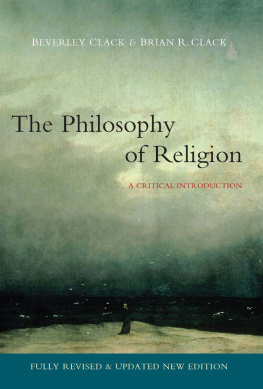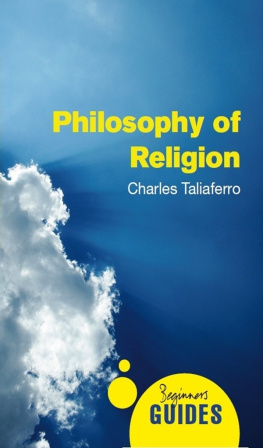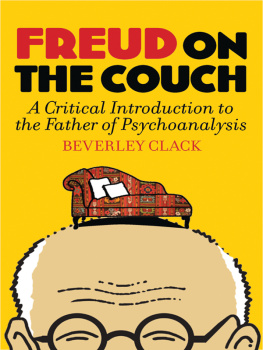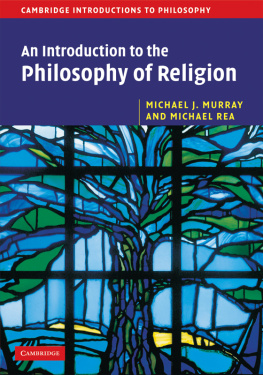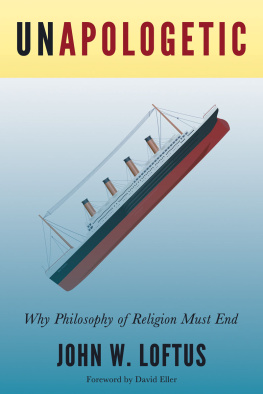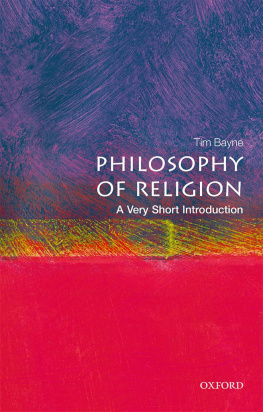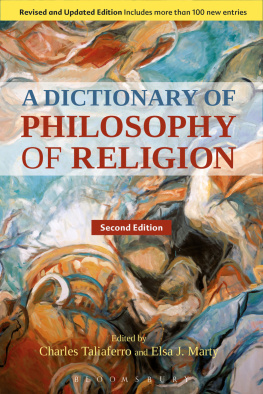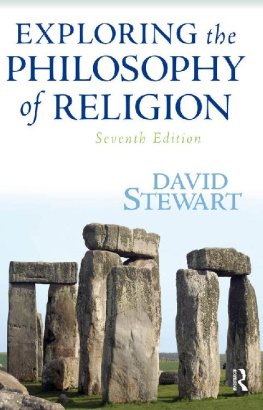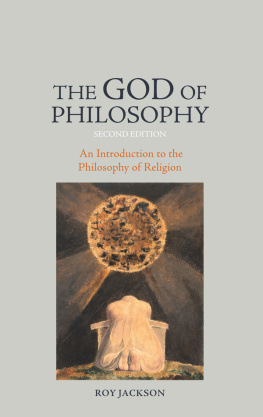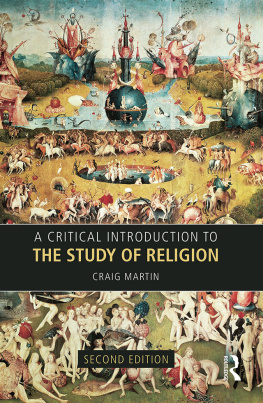The Philosophy of Religion
For Edward Walker
Copyright Beverley Clack and Brian R. Clack 2008
The right of Beverley Clack and Brian R. Clack to be identified as Author of this Work has been asserted in accordance with the UK Copyright, Designs and Patents Act 1988.
First published in 2008 by Polity Press
Polity Press
65 Bridge Street
Cambridge CB2 1UR, UK.
Polity Press
350 Main Street
Malden, MA 02148, USA
All rights reserved. Except for the quotation of short passages for the purpose of criticism and review, no part of this publication may be reproduced, stored in a retrieval system, or transmitted, in any form or by any means, electronic, mechanical, photocopying, recording or otherwise, without the prior permission of the publisher.
ISBN: 978-07456-5699-1
A catalogue record for this book is available from the British Library.
The publisher has used its best endeavours to ensure that the URLs for external websites referred to in this book are correct and active at the time of going to press. However, the publisher has no responsibility for the websites and can make no guarantee that a site will remain live or that the content is or will remain appropriate.
Every effort has been made to trace all copyright holders, but if any have been inadvertently overlooked the publishers will be pleased to include any necessary credits in any subsequent reprint or edition.
For further information on Polity, visit our website: www.polity.co.uk
Contents
Preface to the 2008 Edition
Ten years have passed since the first edition of this introduction to the philosophy of religion appeared. We have valued the opportunity and the challenge of revisiting what we wrote then, and we hope the end result is an edition that will continue to stimulate its readership.
While the structure of the book is largely the same, with updated references where appropriate, there are some significant differences. In chapter one, we offer more explicitly than was the case in the first edition our understanding of religion as a cultural phenomenon that encompasses beliefs, values, attitudes and practices, often with a supernatural focus, and with institutional manifestations. This definition allows us to maintain more coherently our view that an approach that explicitly sees religion as a human phenomenon allows for a more diverse and creative philosophy of religion to emerge. At the same time, we have spent more time on the concept of God, and so chapter two has been largely rewritten. We hope that this will clarify some aspects of the concept that were omitted from the first edition, and that our readers will feel that they have a better grounding in the concept than was offered previously.
Ten years is a long time, and even a discipline as resistant to change as the philosophy of religion has seen significant developments. The section on feminist approaches to the philosophy of religion in chapter four has been largely rewritten to reflect the growing body of work in this area. But it is not just developments in the internal discussions of philosophy of religion that we wanted to include in this edition. We felt the need to offer some reflections on what it means to live in a post-9/11 world, with all the political and social ramifications that this shocking event has had. The language of Islamist terrorists and some Western governments suggests that religion has played a pivotal role in making the world a seemingly more dangerous place, and we have sought to offer a philosophical perspective on this context that also reflects something of our hopes for the role that the philosopher of religion might play in constructing a more positive, humane and life-affirming religious perspective.
Our aim continues to be that which shaped the first edition: namely, to show that religion can be meaningful if given a human focus, and that philosophy of religion can be exciting if pursued in a creative way. We hope, more than ever, that our readers will agree with us.
Beverley Clack, Oxford Brookes University
Brian R. Clack, University of San Diego
Preface to the 1998 Edition
Writing this introduction to the philosophy of religion has fulfilled an ambition for us both. For a start, it is not every day that one is able to write a book with ones sibling! Moreover, we have both taught philosophy of religion over a period of some seven years, and have come up against similar problems. The subject-matter of philosophy of religion should be exciting and stimulating, concerned as it is with issues such as the existence of God, the problem of evil and suffering, miracles, immortality, etc.; yet all too often students complain that the literature produced by practitioners of the subject is both difficult and tedious. Perhaps this is because introductions to the subject are often aimed at those already working in this field, rather than at the genuine novice. By way of contrast, we have assumed no such prior engagement. Introductions to the philosophy of religion can baffle and bore; in writing this book we hope to do neither.
Our aim has been to provide sixth-formers and undergraduates with a book that introduces the principal ideas forming the core of any course in the philosophy of religion in an accessible way. At the same time, in the later chapters we have also introduced some of the contemporary debates and developments in the discipline; they should be of particular interest to those already engaged in the subject. In so doing we have used not only the writings of philosophers and theologians habitually drawn upon by philosophers of religion, but also examples drawn from feminist writing and from literature. Religion should be seen as providing colour to life; as such, we have sought to produce an introduction which stimulates and excites, encouraging the reader to pursue some of the ideas that are outlined and the sources that are used. One way in which we hope to achieve this end is through the use of box exercises. These are designed to help students monitor their own understanding of the subject, whilst aiding the development of their own thinking about the issues under consideration. We are building upon Wittgensteins comment that anything your reader can do for himself, let him!
The structure of the book is as follows: in chapter one we seek to define the philosophy of religion. Introductory texts tend to ignore the problematic nature of religion and plunge straight into the main focus for the philosophy of religion (i.e. accounts of God, miracle, evil, etc.). This is an unsatisfactory omission, and in this chapter we offer a consideration of different definitions of religion, and some opening reflections on what it means to pursue the philosophy of religion.
Chapter two turns our attention to what often proves to be the heart of philosophical discussions of religion: the arguments for the existence of God, and the attributes that are ascribed to this God. Our aim in this chapter has been to introduce students to the God of theism. Chapter three picks up on these ideas by considering some of the challenges that have been levelled against theism. Thus, the problem that evil poses for the God of theism is considered, and the problem of theistic language addressed. Theism presupposes that only a supernatural being (God) can account for the nature of this world and the practice of religion. In considering alternative natural histories of religion, this presupposition is challenged, for, as such thinkers as Hume, Tylor and Feuerbach argue, a supernatural explanation is not required to explain adequately the presence of religion in this world.

